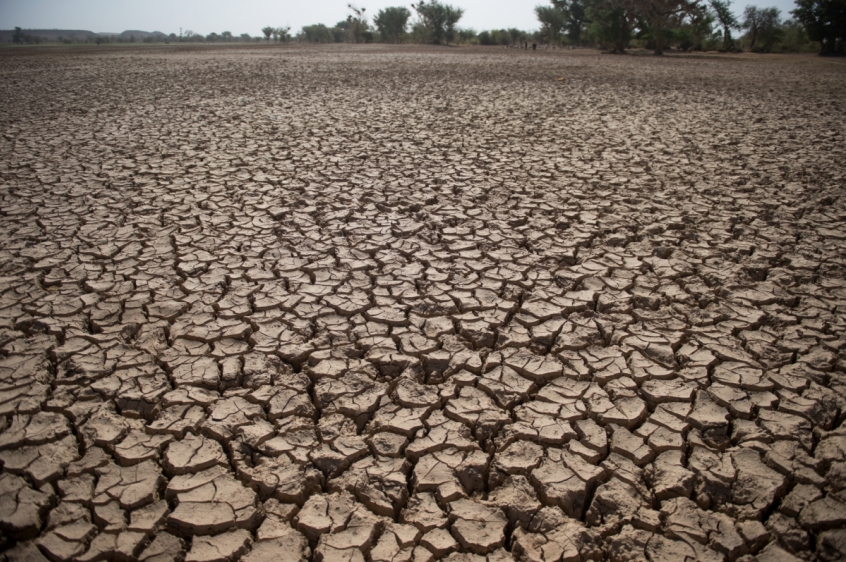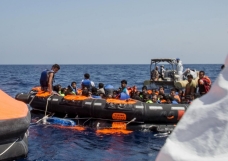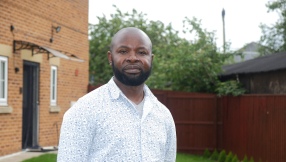The traditional Hollywood dream from our childhoods that 'they all lived happily ever after' has turned into a nightmare where they all die horribly. In recent years we have seen countless movies about the future offering an apocalyptic vision of the destruction of the planet. Whether it's the rise of self-conscious machines, nuclear holocaust, weaponised viruses or alien invasion Hollywood is finding it increasingly hard to imagine that in the future people will live at all, let alone happily. I wonder if it is because our multiplexes are full of doomsday scenarios, that we are becoming ambivalent and apathetic when we hear about actual crises that threaten the future of the planet. Do rising tides and melting ice caps sound too much like science fiction to radically change our behaviours? Do scenes of global meltdown, mass exodus and panic simply get automatically filed in the part of our psyche marked "entertainment"?
These are hard questions for us to face. We may prefer to feel that the problems are just too far away geographically, rather than morally. Perversely it may be the trivial experience of the introduction of supermarket plastic bag costs this week, that will bring home the message that we need to take a little responsibility for the planet. However the moral question remains - are we recycling more because of conviction of consequences or social pressure to conform? Does the average person actually care about the future of the planet or do they feel it is a lost cause? When a major car manufacturer like Volkswagen admits it has been faking emissions results for some of its diesel vehicles, it does leave the impression that it is conformity, rather than conviction, driving the limited ecological interest we see.

I worry that the environmental challenge seems to bring the worst out of us. Our lack of concern betrays a xenophobic selfishness. However much we talk about the intrinsic dignity of all human beings, we continue to make lifestyle choices that knowingly adversely affect others around the planet. Or perhaps even more damningly; our lack of concern betrays a disregard for our children. However far we say we will go to protect our own flesh and blood, we don't seem to go so far as to radically protect the environment for our offspring and the generations that follow. As the Pope has said this week to an audience at the White House, environmental problems can 'no longer be left to a future generation.'
I can't fix the wider cultural appetite for disaster movies. I can't force people to care about the global damage being done by our lifestyle. But I do believe there is something that Christians can do to put our own house in order on these issues.
At its heart, Christianity offers a great hope to our world. The four biographies of Jesus bear the title Gospels, which means Good News. Christ offered a good news message of hope to Jews living under Roman occupation, he offered physical and spiritual help and hope to those most people ignored: the leper, the underclass, the refugee. Those that the first century culture pretended were invisible and insignificant Jesus treated with special dignity. And the thrust of the message of hope Jesus offered to all was about transformation, both of our lives and our world.
It is possible that Christians have lost this reputation for "good news". A blood moon appears and suddenly there are headlines about nervous Christians stockpiling food. For some fundamentalist groups even the Pope's trip to the USA is seen as the kickstart of Armageddon. Doomsday scenarios seem to bring the crazy out of some Christians, yet when scientists predict environmental catastrophe there has been a lot of resistance from these same believers. Not because they are offering good news, but because they are possibly burying their heads in the sand.
It's easy to point a finger at the fundamentalist fringe who have been mass marketing the apocalypse through films like A Thief in the Night and Left Behind, based on a weakly constructed theology of rapture where believers are beamed up to heaven to avoid the catastrophes awaiting the planet. Their theological vision is called "Premillenialism" and according to Professor Peter Kuzmic of Westminster Seminary has led to a laissez-faire attitude to everything from global development to environmental concern. But you don't have to live in the Bible belt to be affected by this way of thinking. Sadly many of us started our Christian journey with a version of the gospel message that emphasises this escapist eschatology. We were told that this world is a sinful place and that Jesus came to die in order to bridge the gap between unholy people and a holy God. We were told that by giving our heart to Jesus we could be saved from this world and be with Jesus when we die.
Of course there is much more to the Gospel than that, but look hard enough at most evangelistic courses, sermons and books and you will be able to identify this same basic approach to Christianity. Sadly with the best intentions, Christians have tended to deliver an altered and edited gospel that is robbed of its scale and supremacy, producing zombie Christians that are merely souls waiting for heaven, rather than ambassadors for Christ, or stewards of creation or followers in the footsteps of the Jesus who cared about what was going on in the world around him.
Ours is often a sub-biblical Christianity which owes more to cultural captivity than courageous commitment. I am sorry that we theologians haven't done more to challenge the separation. I am sorry that we pastors have simply replicated someone else's articulation of the gospel rather than doing our theological homework and being faithful to scripture. It's time for us to reconnect with the whole of scripture, to allow God's word, not cultural pessimism, to set the agenda for how the church will play its part in God's plans for the world.
The Bible clearly teaches us to care about justice, evangelism, the vulnerable and the truth. But why should these commitments make us more committed to fight against climate change?
1. If we care about justice we have to care about climate change
Micah tells us that the worship God seeks from us is "to act justly and to love mercy and to walk humbly with your God." Micah 6:8
This is a common thread throughout the Old Testament and in the New Testament. Seeking justice is a fundamental part of our discipleship. God's command to love our neighbour - whoever is most vulnerable or in need and in our ability to help - is a key idea that Jesus preached and practised. Jesus deliberately sought out the poor and those overlooked by society. Part of our call to defend the cause of the weak, is to champion justice issues that affect the poor the hardest. The effects of climate change are inherently unjust - those who cause the most problems, suffer last and least, and those who cause the least problems suffer first and most. And so while industrialised countries may be just about coping, changing weather patterns are already causing disasters and conflicts across the developing world. Professor Tom Ackerman argues "Countries like the United States and those of Western Europe have the wealth, technological expertise, and infrastructure to mitigate climate change impacts. All three of these are lacking in poor countries in the African Sahel and Southeast Asia or countries with very limited resources and options such as the Pacific Island nations."
2. If we care about evangelism we have to care about climate change
Salvation Army founder William Booth used to say "you can't tell a man about the love of God if he has an empty stomach." Climate change means that more and more people's stomachs are empty so if we care about evangelism we must care about climate change. To care for someone's soul at the expense of someone's body is a dualism that the Bible knows nothing about. The same Jesus who preached the gospel fed and healed people's bodies. The poorer nations who can cope least well with a poor harvest or a natural disaster, will find it harder and harder to climb out of poverty. Malnutrition, mortality rates, lack of money, lack of education and lack of cohesion in a society will not be helped just by dropping in evangelistic tracts or beaming in radio programmes. We need to play our part in refusing to separate what God has joined together. If we want the world to know the love of Christ we must protect the world and its resources.
3. If we care about the vulnerable we have to care about climate change
In Jesus' day, ethnic divisions and skin conditions meant many people were treated as unacceptable unwelcome sub-human outcasts yet Jesus went out of his way to offer those specific vulnerable people dignity, help and hope. Today we live in a world where refugees are increasingly unwelcome. A church that wants demonstrates the compassion of Christ must show love and mercy to refugees fleeing conflict and crisis. But there is a direct link between climate change and the refugee crisis.
Between 2006 and 2011 Syria experienced its worst drought on record where nearly 85 per cent of the livestock in the country died. Around a million villagers lost their farms and livelihood and ended up in overcrowded cities. This put additional pressures on the water supplies and so in 2011,15 teenage boys borrowed a slogan from the revolutions taking place in other parts of the Arab world and used spray paint to graffiti a wall in Daraa. After the boys were imprisoned, interrogated and tortured the mass demonstrations took to the streets and it wasn't long for before the Assad regime clamped down in a way that lead to the civil war that has claimed the lives of more than 200,000 civilians.
Francesco Femia, director of the Washington DC based Center for Climate and Security, argues that climate change "can exacerbate those conditions that can make conflict more likely." Richard Seager, of Columbia University in New York, warns that not only was climate change a key driver of the Syrian conflict but that it is likely to unleash more wars and therefore more refugees in the coming decades, with Eastern Mediterranean countries such as Jordan and Lebanon particularly at risk. As followers of Christ, we need to seek out the Syrian people whose lives have been devastated by climate change and resultant conflict and offer them help, hope and dignity. We need to make special measures to help the refugees affected by conflict but we need to work to alleviate climate change that has contributed to it.
4. If we care about truth we have to care about climate
Evangelicals talk a lot about truth. We want people to know the truth, we believe in the power of truth and we believe Jesus is the way and the truth. Sadly when it comes to the truth about climate change some Christians have taken an unusual stance. Some evangelicals are among the most vociferous critics of the notion of climate change. It is by no means all evangelicals. There have also been groups such as the Evangelical Climate Initiative (ECI) that have specifically been formed to mobilise American evangelicals into action. Here in the UK, groups such as Micah Challenge helped to promote and champion the Millenium Development Goals which included ambitious targets for environmental sustainability. Yet, there are two groups of Christians that refuse to engage with climate change: the Deniers and the Dualists.
The Deniers challenge the science, either by rejecting science completely or by arguing that science is biased. In response to this the Intergovernmental Panel on Climate Change concluded that they are 95 per cent certain that human activities are driving climate change. The Dualists on the other hand challenge the consequences, because they believe that the world is nearly at the end anyway, and so evangelism should always take priority over economic justice or environmental concern. Although many of them would be happy working as bankers, advising on future savings funds, working as heart surgeons, healing people's bodies, or even as gardeners keeping down the weeds.
So many Christians can hold these things in balance: we can find a way to care about justice, evangelism, the vulnerable, the truth and climate change. There are approximately 2 billion people in the world that identify themselves as Christians. Together we can make a difference. Together our small actions can bring great change. Together our efforts to fight climate change can send a strong signal to those in power that we want a fairer and cleaner world and are prepared to play our part to get it. That's why we need to live differently, pray, and call for change.















